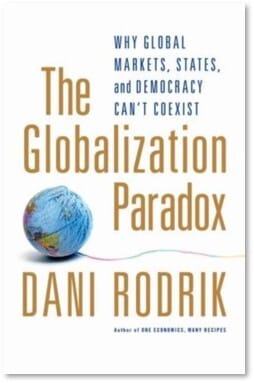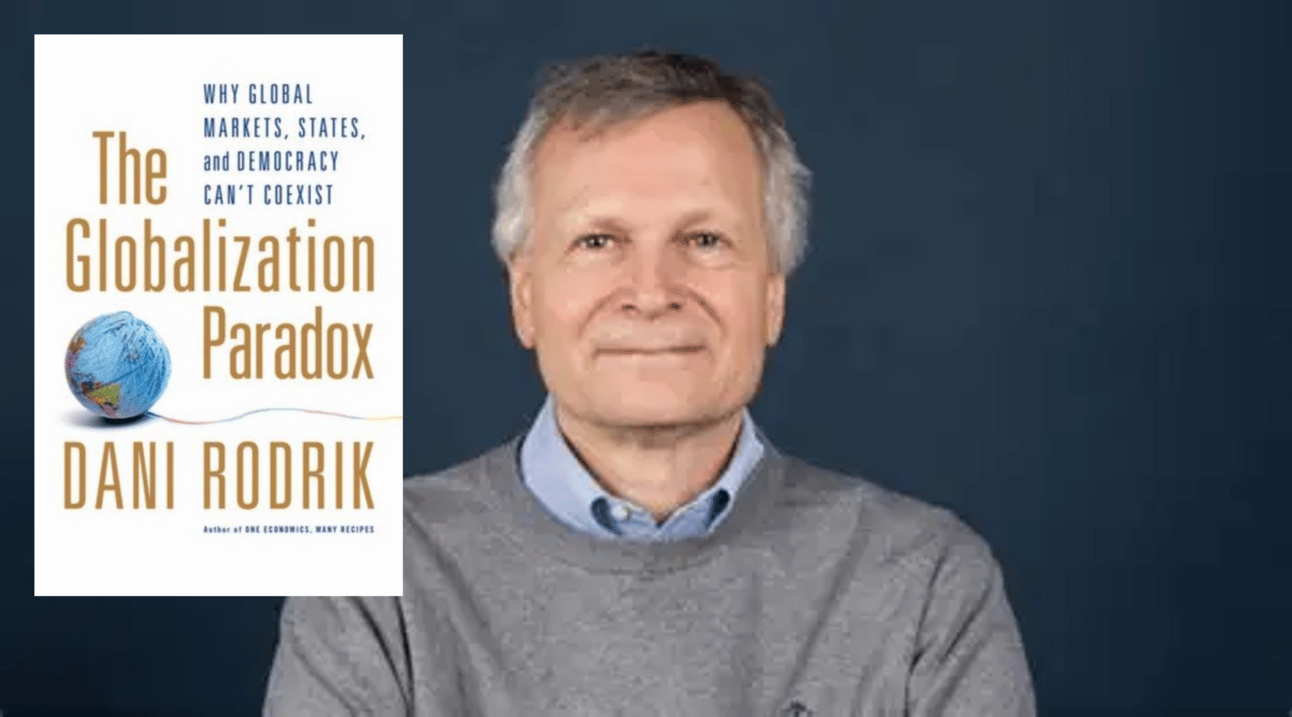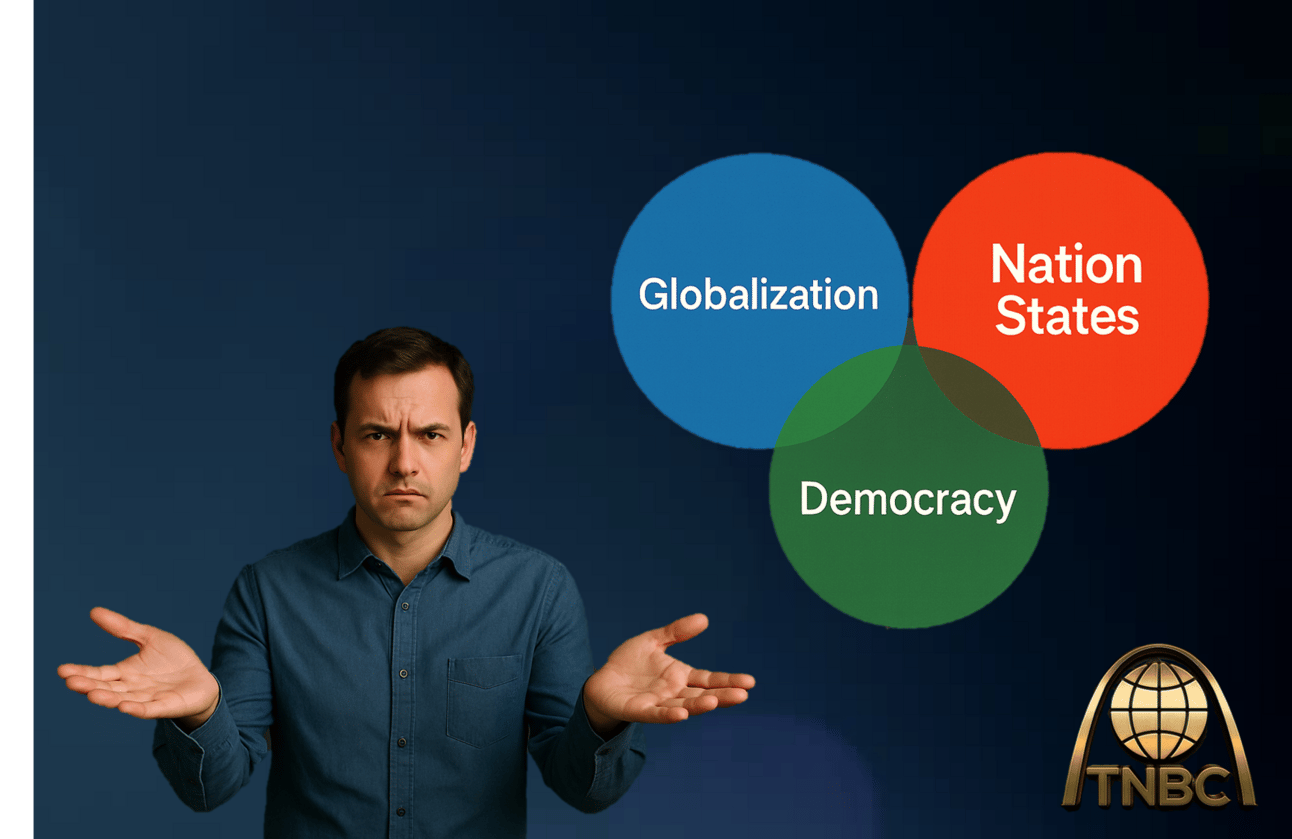
Dani Rodrik - The Globalization Paradox - Why Global Markets, States and Democracy cant Coexist
About this Series
In the series Beacon Books, we explore titles that illuminate the shifting dynamics of global power, economic upheaval, and societal transformation. From geopolitical forecasts to historical patterns, each book offers a vital perspective on the forces reshaping our world. Through these works, we aim to understand not just what is changing, but what’s driving the change - and why it matters.
If you are considering buying the book, check the end of this article
Why you should read this book
If you're trying to understand why the modern world feels increasingly unstable - why democracies are fracturing, nationalism is rising, and global institutions are faltering - The Globalization Paradox is essential reading. It doesn’t just describe the symptoms; it reveals the deeper structural forces behind the changing world order.
In the context of this series, it offers a vital framework for understanding the trade-offs between global integration, national sovereignty, and democratic governance. If you're trying to understand why the modern world feels increasingly unstable - why democracies are fracturing, nationalism is rising, and global institutions are faltering - The Globalization Paradox is essential reading. It doesn’t just describe the symptoms; it reveals the deeper structural forces behind the shifting world order.
Originally published in 2012, the book has only become more relevant with time. The world has unfolded almost exactly along the fault lines it described - trade wars, rising populism, broken supply chains, political backlash against global institutions - demonstrating the lasting power and accuracy of Rodrik’s framework. What seemed like a provocative hypothesis then now reads like a roadmap for understanding the world we’re living in today.
Its value goes far beyond theory. The book provides foundational knowledge: from the early days of trade and the rise of corporate empires like the Hudson’s Bay Company, to the design of the post–World War II monetary order and the creation of institutions like the WTO and IMF. It addresses wealth inequality, the stagnation and dependency of many developing nations, and the systemic dysfunctions built into our global architecture - such as dollar dependence, rigid trade rules, and the erosion of democratic control.
More than touching on the themes of The NextBigCycle, this book lays out the systemic nature of those forces and how they interact. It shows that the crises we see today - economic, political, and institutional - aren’t isolated events, but symptoms of a deeper global design flaw. If you want to understand how we got here, and what’s likely to come next, this book is not just useful - it’s indispensable.
About Dani Rodrik
Dani Rodrik is a renowned Turkish-American economist specializing in international political economy and development. He earned his undergraduate degree from Harvard University, followed by a Ph.D. in economics from Princeton University. Currently, he is the Ford Foundation Professor of International Political Economy at Harvard's Kennedy School of Government, where he has spent much of his academic career.
Known for his clarity and independent thinking, Rodrik has become a leading voice in rethinking how global economic rules should align with national interests and democratic legitimacy.
Rodrik’s work focuses on the relationship between globalization, national sovereignty, and democratic governance. He has published extensively on trade policy, economic development, and the role of institutions in shaping economic outcomes. Beyond academia, he has served as an advisor to international organizations and governments seeking to navigate the challenges of economic integration without sacrificing domestic stability.
Framing the Big Picture
What if we can’t have globalization, national sovereignty, and democracy all at once? We’re forced to choose two - and the cost of that choice is reshaping the world.
Globalization promised a world that was more connected, more prosperous, and more stable. But as borders opened and markets expanded, something unexpected happened - nations began to feel less in control, and citizens more divided. The tensions we see today between international institutions, domestic politics, and economic uncertainty aren’t just the result of policy failures - they point to a deeper structural conflict. At the heart of this lies a critical question: can a country remain truly democratic and sovereign while fully embracing global economic integration?
This is the central dilemma explored in The Globalization Paradox. The book argues that we face an unavoidable trade-off between three core values: economic globalization, national sovereignty, and democratic governance. According to this “trilemma,” any two can coexist, but not all three at once. Deep globalization, with its uniform rules and global institutions, often forces countries to sacrifice either democratic responsiveness or national autonomy.
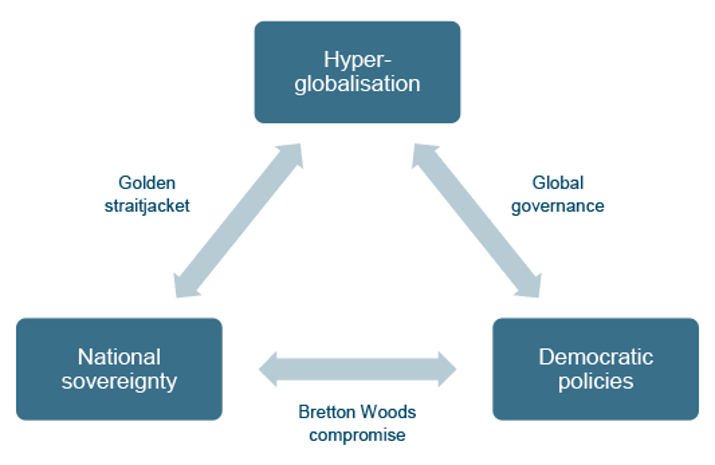
Dani Rodrik, Globalization Trilemma
The book calls for a rebalancing - a move toward “thin globalization” that keeps markets open but allows countries to set their own policies in line with local values and democratic priorities. The message is clear: globalization must be shaped by people and their institutions, not imposed from above. Only then can it be politically legitimate, socially sustainable, and economically resilient.
Key Concepts & Arguments
The Globalization Trilemma: Countries can have two of the following three - democracy, national sovereignty, and hyper-globalization - but never all three at once.
Thin vs. Deep Globalization: “Thin” globalization respects national differences and local democratic choices; “deep” globalization imposes uniform rules and institutions, often undermining sovereignty.
Markets Are Embedded: Markets function within political and social frameworks - they are not self-regulating, and trying to separate them from domestic politics invites instability.
The Return of Bretton Woods Logic: Rodrik praises the post-WWII era’s compromise - open trade without overriding national policy autonomy - as a more stable model.
Global Governance Limits: Attempts to build one-size-fits-all global rules often fail because they clash with local values, institutions, and voter demands.
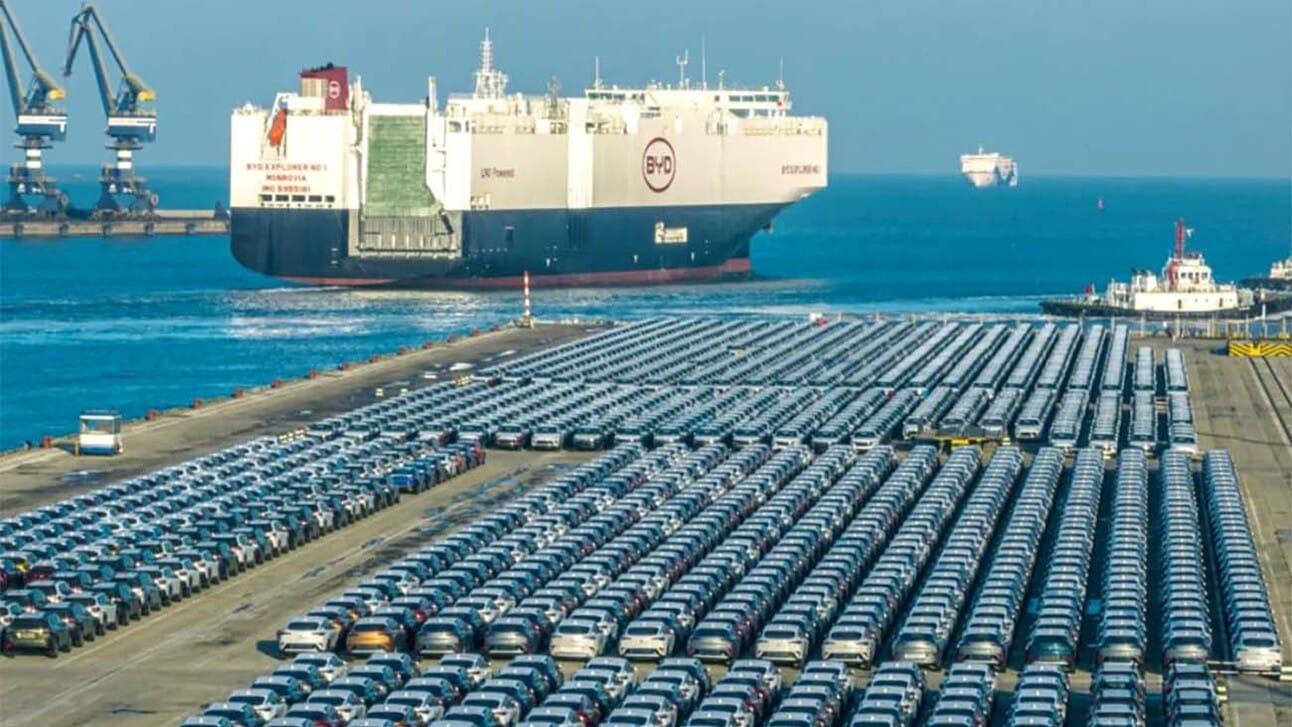
EXPLORER NO.1 expands BYD’s international logistics capabilities. Source: BYD
Then vs. Now — Relevance Today
When Rodrik wrote the book, the world was still recovering from the 2008 financial crisis. Back then, his warnings about globalization’s political limits were seen as contrarian. Fast forward to today, and his framework feels prophetic. The backlash against global trade deals, the rise of populism, Brexit, trade wars, COVID-era supply chain nationalism, and re-industrialization efforts in the West all reflect the tension he warned about: when people feel their national and democratic choices are being overridden by global economic rules, they push back.
As today’s world becomes more multipolar and fragmented, Rodrik’s diagnosis offers clarity: the real crisis isn’t just economics—it’s the conflict between global integration and democratic legitimacy.
Broader Connections — What This Book Helps Explain
Rodrik’s insights echo and complement other key works that explore the fault lines of global order:
Kishore Mahbubani and Ha-Joon Chang have both highlighted how the rules of globalization often reflect the interests of dominant powers.
Rodrik helps explain why globalization isn’t just an economic project - it’s a political balancing act. His work bridges economics, history, and institutional politics in a way that makes today’s global tensions far more intelligible.
Reflection — What to Remember, What to Watch
The key takeaway is this: Globalization is not all-or-nothing. Pushing for deep, unregulated integration without political consent and institutional safeguards will always provoke resistance. The world doesn’t need more global uniformity—it needs flexibility, pluralism, and room for local variation.
As we enter a new era of economic nationalism, industrial policy, and geopolitical fragmentation, the question is not whether globalization will retreat—but how much, where, and in what form. Watch for future conflicts not just between countries, but between the global and the local, the technocratic and the democratic.
Why Read This Book Now?
Because today’s headlines—from trade wars to populist protests to fractured alliances—don’t make sense unless you understand the core trade-offs Rodrik exposes. This book gives you a framework to decode the deeper logic behind global tension, helping you move beyond surface-level takes. In a world that feels increasingly divided, The Globalization Paradox offers one of the clearest maps of the forces pulling it apart.
How to read and buy the book
This might be one of those rare books you’ll want to keep in multiple formats in your personal library - hardcover or paperback to annotate, e-book for quick reference, and audiobook for immersion on the move. It’s that foundational.
Personally, I found it incredibly effective to listen to the audiobook first, cover to cover, while hiking in nature or commuting. That helped me grasp the big picture and core ideas. Later, I returned to the physical copy to study specific chapters and arguments more closely - especially sections on the globalization trilemma, Bretton Woods, and the limits of international institutions.
The book is about 370 pages long, or roughly 11 hours as an audiobook at normal speed. And unlike some dense economic texts filled with charts, data tables, or academic jargon, this one is surprisingly accessible and works very well in audio format. It reads like a guided tour through the machinery of globalization - clear, structured, and thought-provoking, even without visuals.
If you want to purchase the book in any format: please follow the link below to support TheNextBigCycle. As an Amazon Associate I earn from qualifying purchases, so you’re fuelling my daily caffeine fix—and this newsletter right along with it.
